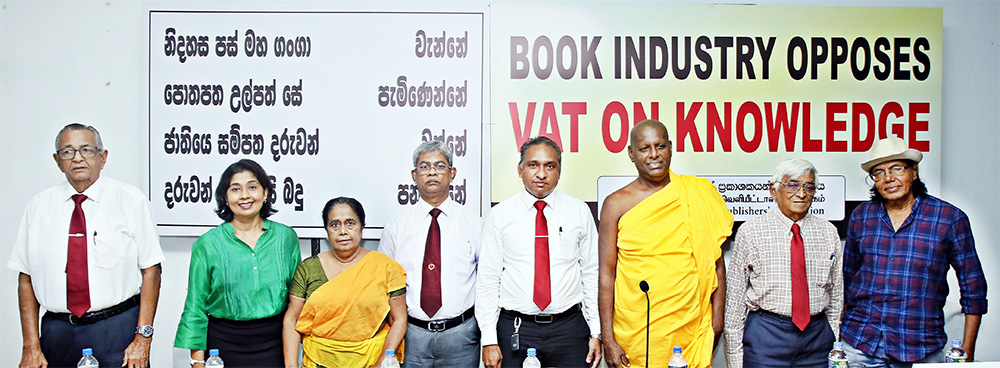Business
Book industry stakeholders decry ‘further taxing of reading and learning’

By Ifham Nizam
Industry associations, academics and writers expressed concern over the long-term consequences of making books more expensive for the masses. All stakeholders stressed that they would go all out to bring justice to the book lovers and the industry, at a media briefing held at the SLFI on February 2.
Accordingly, Sri Lanka’s book industry called for an immediate reversal of the decision to impose a tax of 18% on the sale of books, in terms of the recent VAT revisions.
General Secretary of the Sri Lanka Book Publishers Association (SLBPA) Dinesh Kulatunga, in response to a query by The Financial Island Review said that over the past few decades, the local book industry has diligently produced books using imported paper, plates, inks, chemicals and machinery, consistently paying all required import taxes, including VAT.
He said that the cumulative amount contributed by the industry in the form of these taxes exceeds Rs. 1 billion. This tax has been levied on book production by both the state and private sectors.
Kulatunga added: “We have never sought subsidies for these activities. However, we are now respectfully requesting the government to reconsider this decision, as the ultimate burden of this additional 18% tax will fall upon the general public, including students, as a form of a tax on reading and learning.
“We wrote to the IMF that since gaining independence in 1948, our nation has been committed to providing books at an accessible cost to students, educators, education authorities, universities, and the general public. This was made possible by the absence of taxation on books, which serve as the primary repository of knowledge across a diverse range of subjects. Books are not merely a fundamental element of human civilization; they continue to mold our comprehension of the world around us. They serve as versatile tools that enrich our lives by disseminating and safeguarding knowledge, promoting communication, nurturing creativity and serving as educational, entertainment, and cultural resources.
“In the light of these circumstances, we earnestly requested the authorities to reinstate books under the exemption from VAT. We also requested an opportunity to engage in a further discussion regarding this matter, given its profound significance to a knowledge-based economy and our society as a whole. But there was no response.
“Countries like the UK, USA, India, China, Japan, Saudi Arabia, and Brazil, do not levy VAT on books. Therefore, we do not believe that the IMF has compelled the imposition of a tax on books; it may be an inadvertent error made by our officials. We are optimistic that they will reevaluate this decision.”
Speakers representing different stakeholder groups in the book industry also charged that with the indiscriminate extension of VAT to a highly sensitive and vulnerable sector like books, Sri Lanka was also in violation of the UNESCO Florence Agreement of 1950, to which the country was an early signatory and continues to be a Contracting State.
The UNESCO Florence Agreement is a treaty that binds Contracting States not to impose customs duties and taxes on certain educational, scientific, and cultural materials that are imported.
The Sri Lanka Book Publishers Association Past President, Vijitha Yapa said: “Last year in September when the 18 per cent VAT on books was announced, we met President Ranil Wickremesinghe and discussed about exempting books from VAT. The President said that that is one of the IMF conditions.”
Yapa also said nothing had happened since then. “After lobbying and writing letters to the Finance Ministry, relevant authorities and various ministers, we were asked to write to the IMF directly and sort things out as we were given to understand that it was an IMF condition and that the authorities have no control over it.”
Yapa added: “It is an obstacle towards the expansion of knowledge in this country as people can’t afford to buy books. Any book publisher or printer with a monthly turnover of over Rs. 5 million is liable for VAT on top of all the other taxes that are imposed when importing the raw materials for printing.”
Meanwhile, Writers Organization of Lanka, Secretary Kamal Perera told The Island Financial Review that:
“If we are talking about VAT on books, I think this will strongly affect the reader and the writer. In my opinion, they should be informed about the unfairness of this tax and raise a national-level protest that the rulers could feel.
“I see it as a very futile action to submit proposals to the government. It’s a failure like playing the harp for deaf elephants. It’s now very clear that this government will never listen to the people’s voice.
“I do not see any practical solution other than building a broad public opinion demanding the immediate removal of this unjust tax.”
Sri Lanka Books Importers and Exporters Association, President, Dinushi Abeywickreme stated, “It’s not just the 18 per cent VAT that is added to the price of the book, but an overall tax of 30 per cent, inclusive of other taxes and a price hike of all raw materials following the COVID-19 pandemic and economic crisis in Sri Lanka.”
Business
The government is taking steps to streamline trade facilitation, customs processes, investment approvals, and improving export facilities – Prime Minister

Prime Minister Dr. Harini Amarasuriya stated that the government is taking steps to strengthen local exporters by making trade facilitation, customs procedures, and investment approvals more efficient, and by improving export services.
The Prime Minister made these remarks while addressing the 27th Presidential Export Awards 2024/25 ceremony organized by the Ministry of Industries and Industrial Development together with the Export Development Board.
At this ceremony, which was held to recognize the best exporters of Sri Lanka for the financial year 2024/2025, a total of 107 awards including 15 overall awards and 92 sectoral awards for products and services were presented. Merit awards were also presented to eligible sectors based on applicants’ performance and their contribution to national economic development. Awardees were selected on several criteria such as export market diversification, job creation, growth in export revenue, repatriation of export income, environmental sustainability, institutional social responsibility, and value addition.
Institutions that demonstrated outstanding performance in the export sector were presented with the prestigious Presidential Export Awards for the year under the patronage of Prime Minister Dr. Harini Amarasuriya and Minister of Industries and Industrial Development, Mr. Sunil Hadunnetti.
Further expressing her views, the Prime Minister stated:
“The Presidential Awards Ceremony for exporters reminds us that Sri Lanka’s progress depends not merely on policies or administration, but on the ability to produce, to create value, and to compete internationally.
Over the past year, we faced numerous challenges. As a result, global markets and supply chains were disrupted. Economic uncertainty prevailed. We faced natural disasters. Despite this, many exporters had to adjust to these changes, reorganize production processes, diversify customers, and adopt digital technologies in order to remain competitive in the market.
The impact of the Ditwah cyclone also affected several industries within the export sector. Production facilities, storage facilities, and transportation routes in affected areas were damaged. Production chains and delivery schedules were disrupted.
Under such a difficult situation, some exporters experienced significant setbacks while trying to meet international export demands.
The government is taking steps to support exporters by assessing the damages they suffered due to the emergency situation, restoring their operations, and helping them recover. The government is also working to strengthen resilience against future natural disasters and to rebuild affected areas in a way that minimizes the risk of similar situations arising again.
Sri Lanka is currently undergoing a new economic transformation. For many years, instability, policy inconsistencies, and administrative inefficiencies hindered the progress of the country. This weakened investor confidence and made it difficult for businesses to plan ahead.
However, the present government is committed to governance based on stability, transparency, and accountability. This is not a short-term approach. It is a long-term process to ensure that the country does not fall back into uncertainty.
For this purpose, the government is implementing strong fiscal management, predictable policies, clear and simplified regulations, anti-corruption measures, major institutional reforms, measures that allow businesses to plan ahead, instill investor confidence, minimize unnecessary barriers, and support the development of the private sector.
For a long time, we relied heavily on international loans to sustain national expenditures. However, this is not leading a path toward a stable future. Our progress depends on our ability to earn through trade, innovation, and global engagement.
Your ability to take Sri Lankan expertise and creativity to the world is a strength for the entire nation. The government is ready to extend the necessary support to achieve this.
We understand that issues such as policy inconsistencies, delays that increase operational costs, limited access to competitive financing, gaps in infrastructure and technology, weaknesses in trade facilitation, and slow progress in expanding market access have impacted you. I would like to assure you that the government is directly addressing these challenges.
The focus of the government has drawn to build efficient, transparent, and predictable systems, streamlining trade facilitation, customs processes, and investment approvals, improving export facilities, and minimizing the gap between local businesses and global markets.”
This event was attended by Ministers Kumara Jayakody, Ramalingam Chandrasekaran, Sunil Kumara Gamage; Deputy Ministers Chathuranga Abesingha, Eranga Weerarathna, Arun Hemachandra, Nishantha Jayaweera, Muditha Hansaka Wijayamuni; Governor of the Central Bank Nandalal Weerasinghe; Secretary to the Ministry of Industries and Industrial Development Tilaka Jayasundara; Chairman of the Export Development Board Mangala Wijesinghe, along with ambassadors, foreign delegates, exporters, and a large gathering.
[Prime Minister’s Media Division]
Business
India unveils future of South Asia’s construction industry

South Asia’s largest construction equipment exhibition began December 9 in Bangalore, India showcasing a broad range of next-generation machinery and technologies. Equipment and tools demonstrated improved productivity, advanced controls, energy-efficiency, telematics integration, IoT-enabled monitoring and predictive maintenance. These innovations support better project outcomes across roads, highways, rail, and metro. Sea ports. Airports, mining and development.
The event stands as a platform for collaboration, knowledge exchange and business engagement. It brings together stakeholders who are shaping India’s transition towards infrastructure that is smarter, greener and aligned with global standards.
“India continues to strengthen its position as one of the world’s most dynamic growth engines supported by decisive policy direction and a renewed national focus on infrastructure” said Rajiv Memani President Confederation of Indian Industry (CII) at the inauguration of EXCON 13th edition held at Bangalore International Exhibition Centre, Bengaluru. Memani further stated that as investment expands across transportation, logistics, urban development and manufacturing, EXCON 2025 becomes a vital platform to showcase how industry and innovation are shaping this momentum.
Speaking at the inauguration R Mukundan President designate CII and Chairman EXCON 2025 noted that ‘’India is on a historic growth trajectory aiming to become a $30 trillion economy by 2047 under the Viksit Bharat vision and Infrastructure will be the backbone of this transformation with INR 11.21 lakh crore allocated for Financial Year 2025/26. Projects such as Bharatmala, high-speed rail and Smart Cities under PM Gati Shakti are driving connectivity and urban development.” He said Excon supports this by bringing innovators, policymakers and industry leaders together to introduce automation, IoT, AI-driven machinery and green technologies to improve execution and competitiveness. He added, “Every edition sets benchmarks and will continue to empower stakeholders and drive modernisation.”
“EXCON 2025 stands as a testament to India’s growing engineering excellence and global aspirations. As we embrace new technologies and sustainable practices, the Indian construction industry is poised shape the infrastructure landscape of tomorrow” said Deepak Shetty, President ICEMA and CEO/MD JCB India Ltd.
“The exhibition brings together Industry leaders, policy makers and innovators of South Asia to highlight the crucial role of advanced technologies, manufacturing strength and green practices in shaping the national growth as we move in to a new era of infrastructure” said Chandrajith Banerjee, Director General, CII.
Over one million business visitors are expected during this period. Over 1250 exhibitors display a wide range of construction equipment from across the world with 7 country pavilions from China, France, Germany, Italy, South Korea, Turkey and the United Kingdome. They showcase a wide spectrum of global construction technologies and equipment solutions. The presence of these pavilions reinforces EXCON’s role as a bridge between global innovation and South India infrastructure goals.
OTR Lanka and Laugfs Corporation (Rubber) Ltd took part as trade partners from Sri Lanka.
Event was sponsored by well reputed brands such as; AJAX, BKT, CATERPILLAR, conmar, JCB, KOBELCO, KOMATSU, MRCRUSHING IT, PUZZOLONA, RMX, SANY, SCHWING Stetter, TATA HITACHI, VENUS, ACE, Apollo, ARX, Bobcat, EMERALD, HAIL STONE. HYUNDAI, MAHAVEER DISTRIBUTORS, Parker, VELVEX, walavoil, wipro and WIRTGEN GROUP.
by Claude Gunasekera
Business
CHEC South Asia & Southeast Asia completes emergency clearing of A5 Highway

China Harbour Engineering Company Ltd South Asia & Southeast Asia, working in close coordination with the Sri Lanka Army, the Road Development Authority (RDA), local authorities and surrounding communities, has recently completed the emergency clearing of the A5 highway, restoring a vital transportation link that had been severely obstructed by landslides and debris in the aftermath of Cyclone ‘Ditwah’. The work was carried out from 04th December to 10th December over a continuous seven-day period.
The A5 highway, a key route for community connectivity, emergency service access and the transport of essential supplies, became impassable after the cyclone triggered extensive damage across multiple regions. Responding to urgent requests from relevant authorities, China Harbour South Asia & Southeast Asia mobilised its specialised rescue teams, heavy machinery and technical expertise to accelerate the clearance process and support national recovery operations. China Harbour has been working in Sri Lanka since 1998, marking 27 years of partnership with the country. The company noted that it has also actively participated in rescue and relief efforts during major national disasters such as tsunamis, bomb attacks and the COVID-19 pandemic, underscoring its longstanding commitment to Sri Lanka during moments of crisis.
A coordinated ground operation involving rescue personnel, 24 land-clearing machines and 36 trained workers was deployed to the affected areas. Working through unstable terrain and challenging weather conditions, the team removed large volumes of earth, fallen trees, rocks and damaged structures, allowing authorities to safely reopen the highway for public use.
The restoration of the A5 highway forms an important component of the company’s broader relief efforts following Cyclone ‘Ditwah’. These efforts included early rescue deployments, the distribution of emergency supplies and coordinated financial support through the Chinese Chamber of Commerce in Sri Lanka (CCCSL), reaffirming China Harbour South Asia & Southeast Asia’s commitment to supporting the country during times of national need.
-

 Features3 days ago
Features3 days agoFinally, Mahinda Yapa sets the record straight
-

 News5 days ago
News5 days agoOver 35,000 drug offenders nabbed in 36 days
-

 News4 days ago
News4 days agoCyclone Ditwah leaves Sri Lanka’s biodiversity in ruins: Top scientist warns of unseen ecological disaster
-

 Features6 days ago
Features6 days agoThe Catastrophic Impact of Tropical Cyclone Ditwah on Sri Lanka:
-

 News5 days ago
News5 days agoRising water level in Malwathu Oya triggers alert in Thanthirimale
-

 Features3 days ago
Features3 days agoHandunnetti and Colonial Shackles of English in Sri Lanka
-

 Business2 days ago
Business2 days agoCabinet approves establishment of two 50 MW wind power stations in Mullikulum, Mannar region
-

 Business5 days ago
Business5 days agoSri Lanka betting its tourism future on cold, hard numbers













